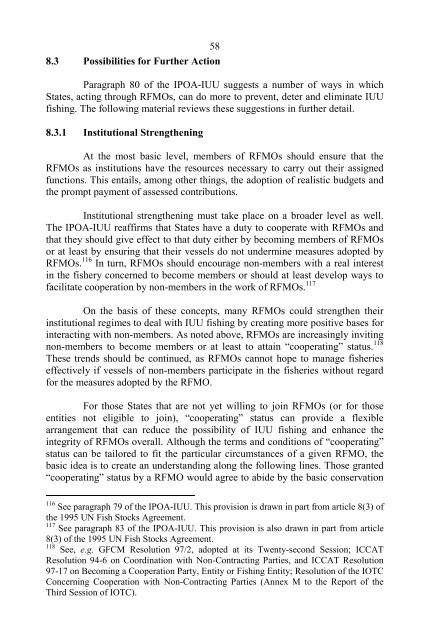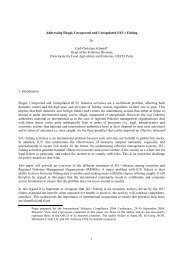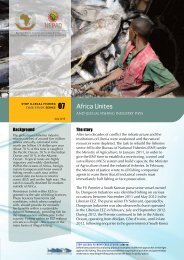57call on their members to take action against vessels withoutnationality that are fishing in the relevant region 114adopt rules to ensure that vessel chartering arrangements do notlead to <strong>IUU</strong> fishingadopt port inspection schemes, restrictions on transshipment at seaand schemes creating a presumption that fish harvested by nonmembervessels in the relevant region should not be permitted to belanded in ports <strong>of</strong> membersadopt catch certification and/or trade documentation schemesadopt other market-related measures to combat <strong>IUU</strong> fishing8.2 Examples <strong>of</strong> Measures Adopted by RFMOsA growing number <strong>of</strong> RFMOs have already adopted at least somemeasures directed at preventing, deterring and eliminating <strong>IUU</strong> fishing, anumber <strong>of</strong> which have been discussed above. One analysis prepared in advance<strong>of</strong> the Expert Consultation on Illegal, Unreported and Unregulated Fishing thattook place in Sydney, Australia, from 15 to 19 May 2000 indicated adoption <strong>of</strong>the following types <strong>of</strong> measures at the regional level:registers and information relating to <strong>IUU</strong> fishing (CCAMLR, FFA,GFCM, IATTC, IBSFC, ICCAT, IOTC)inspection and enforcement (CCAMLR, FFA, IBSFC, ICCAT,IOTC, NAFO, NEAFC, NPAFC)VMS (CCAMLR, ICCAT, IOTC, FFA, NAFO, NEAFC)presumptions (CCAMLR, ICCAT, NAFO)landings, port inspection and transshipments (CCAMLR, CCSBT,IBSFC, IATTC, ICCAT, IOTC, NAFO, NEAFC)trade measures (CCAMLR, CCSBT, IBSFC, ICCAT, IOTC,NPAFC)cooperation with non-members (CCAMLR, CCSBT, GFCM,IATTC, ICCAT, IOTC, NAFO, NASCO, NPAFC) 115For updated information on what these and other RFMOs are doing toprevent, deter and eliminate <strong>IUU</strong> fishing, please refer directly to their websites,many <strong>of</strong> which are listed in Appendix VI to these guidelines.114 As discussed in Section 3.2.3 <strong>of</strong> these guidelines, schemes adopted by ICCAT andNEAFC call upon their respective members to take action against vessels withoutnationality in accordance with international law. To the extent that the rules <strong>of</strong>international law regarding the permissible scope <strong>of</strong> such actions may not be entirelyclear, RFMOs may wish to provide more specifically which types <strong>of</strong> actions againststateless vessels should be taken.115 For extensive discussion on actions taken by RFMOs to address <strong>IUU</strong> fishing andrelated matters, see J. Swan, supra note 113.
588.3 Possibilities for Further ActionParagraph 80 <strong>of</strong> the <strong>IPOA</strong>-<strong>IUU</strong> suggests a number <strong>of</strong> ways in whichStates, acting through RFMOs, can do more to prevent, deter and eliminate <strong>IUU</strong>fishing. The following material reviews these suggestions in further detail.8.3.1 Institutional StrengtheningAt the most basic level, members <strong>of</strong> RFMOs should ensure that theRFMOs as institutions have the resources necessary to carry out their assignedfunctions. This entails, among other things, the adoption <strong>of</strong> realistic budgets andthe prompt payment <strong>of</strong> assessed contributions.Institutional strengthening must take place on a broader level as well.The <strong>IPOA</strong>-<strong>IUU</strong> reaffirms that States have a duty to cooperate with RFMOs andthat they should give effect to that duty either by becoming members <strong>of</strong> RFMOsor at least by ensuring that their vessels do not undermine measures adopted byRFMOs. 116 In turn, RFMOs should encourage non-members with a real interestin the fishery concerned to become members or should at least develop ways t<strong>of</strong>acilitate cooperation by non-members in the work <strong>of</strong> RFMOs. 117On the basis <strong>of</strong> these concepts, many RFMOs could strengthen theirinstitutional regimes to deal with <strong>IUU</strong> fishing by creating more positive bases forinteracting with non-members. As noted above, RFMOs are increasingly invitingnon-members to become members or at least to attain “cooperating” status. 118These trends should be continued, as RFMOs cannot hope to manage fisherieseffectively if vessels <strong>of</strong> non-members participate in the fisheries without regardfor the measures adopted by the RFMO.For those States that are not yet willing to join RFMOs (or for thoseentities not eligible to join), “cooperating” status can provide a flexiblearrangement that can reduce the possibility <strong>of</strong> <strong>IUU</strong> fishing and enhance theintegrity <strong>of</strong> RFMOs overall. Although the terms and conditions <strong>of</strong> “cooperating”status can be tailored to fit the particular circumstances <strong>of</strong> a given RFMO, thebasic idea is to create an understanding along the following lines. Those granted“cooperating” status by a RFMO would agree to abide by the basic conservation116 See paragraph 79 <strong>of</strong> the <strong>IPOA</strong>-<strong>IUU</strong>. This provision is drawn in part from article 8(3) <strong>of</strong>the 1995 UN Fish Stocks Agreement.117 See paragraph 83 <strong>of</strong> the <strong>IPOA</strong>-<strong>IUU</strong>. This provision is also drawn in part from article8(3) <strong>of</strong> the 1995 UN Fish Stocks Agreement.118 See, e.g. GFCM Resolution 97/2, adopted at its Twenty-second Session; ICCATResolution 94-6 on Coordination with Non-Contracting Parties, and ICCAT Resolution97-17 on Becoming a Cooperation Party, Entity or Fishing Entity; Resolution <strong>of</strong> the IOTCConcerning Cooperation with Non-Contracting Parties (Annex M to the Report <strong>of</strong> theThird Session <strong>of</strong> IOTC).
- Page 4 and 5:
iiiPREPARATION OF THIS DOCUMENTThe
- Page 6 and 7:
vThe IPOA-IUU is voluntary. However
- Page 8 and 9:
viii6.2 Examples of some port State
- Page 10 and 11:
xiBACKGROUND1. From ancient times,
- Page 12 and 13:
xiii11. The Code is voluntary. Howe
- Page 14 and 15:
1. INTERNATIONAL PLAN OF ACTION - I
- Page 16 and 17:
3Since the late 1990s, a number of
- Page 18 and 19:
5(1) conducted by national or forei
- Page 20 and 21: 7flag States, coastal States and Po
- Page 22 and 23: 9In light of this, the very first
- Page 24 and 25: 11the vessels rarely if ever visit
- Page 26 and 27: 13For example, Japan requires its n
- Page 28 and 29: 15IUU fishing on the high seas. 27
- Page 30 and 31: 17end all forms of government econo
- Page 32 and 33: 19developing States, 36 have introd
- Page 34 and 35: 21If the vessel is fishing on the h
- Page 36 and 37: 23registering a vessel that has a h
- Page 38 and 39: 25RFMOs have a role to play in ensu
- Page 40 and 41: 27FAO, in turn, will make available
- Page 42 and 43: 29species can be caught, what gear
- Page 44 and 45: 31Flag States are also encouraged t
- Page 46 and 47: 33cases, fishing vessels registered
- Page 48: 35light of this, paragraph 51 of th
- Page 51 and 52: 38transshipment at sea is prohibite
- Page 53 and 54: 40supported IUU fishing. For exampl
- Page 55 and 56: 42Japan prohibits port calls by tun
- Page 57 and 58: 44of a NAFO member, it must be insp
- Page 59 and 60: 46discussed in Section 7 of these g
- Page 61 and 62: 48products harvested through IUU fi
- Page 63 and 64: 50products. On the basis of that da
- Page 65 and 66: 52question, while the latter only c
- Page 67 and 68: 54States can also combat IUU fishin
- Page 69: 56RFMOs engage in IUU fishing. No s
- Page 73 and 74: 60resolutions calling on those memb
- Page 75 and 76: 62landings, port control, and inspe
- Page 77 and 78: 648.3.8 Actions in Response to Rema
- Page 79 and 80: 66As a result, IUU fishers often co
- Page 81 and 82: 68A number of other developed State
- Page 83 and 84: 702.4 Measures to control transport
- Page 85 and 86: 10.3 Suggested Format for Reports t
- Page 87 and 88: 74Flag States should closely contro
- Page 89 and 90: 76A coastal State should consider r
- Page 91 and 92: 78To assist States in implementing
- Page 93 and 94: 12. LITERATURE CITED80Agnew, D.J. 2
- Page 95 and 96: 82Greenpeace. 2001. Pirate Fishing:
- Page 97 and 98: 84II. NATURE AND SCOPE OF IUU FISHI
- Page 99 and 100: 86to the Conservation and Managemen
- Page 101 and 102: National Legislation88Legislation16
- Page 103 and 104: 90National Plans of Action25. State
- Page 105 and 106: 9236.2 having taken into account al
- Page 107 and 108: 9446.3 the species, fishing gear au
- Page 109 and 110: 9651.2 cooperation and exchange of
- Page 111 and 112: 98general operating guidelines for
- Page 113 and 114: 100and should consider measures to
- Page 115 and 116: 10280.9 development of observer pro
- Page 117 and 118: 10486.3 the strengthening of region
- Page 119 and 120: 106Articles V, VI, and VII of the A
- Page 121 and 122:
1084.2 To the greatest extent pract
- Page 123 and 124:
110• Compliance with other aspect
- Page 125 and 126:
1126. Information regarding such si
- Page 127 and 128:
114Annex ACommon English Name Scien
- Page 129 and 130:
1164. Parties shall consider and ac
- Page 131 and 132:
118Committed to take steps, consist
- Page 133 and 134:
1209. An export-validated Dissostic
- Page 135:
122APPENDIX VIWEBSITES OF SELECTED
















